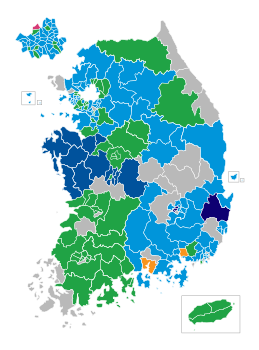General election in South Korea in 2008
The 2008 general election in South Korea took place on April 9, 2008. Around 38 million South Koreans eligible to vote were called to vote on the 299 seats in the National Assembly . 245 people's representatives were elected directly in the electoral districts and 54 seats were allocated according to proportional representation. The conservative Hannara Party ( 한나라당 , Grand National Party) of the new President Lee Myung-bak , who has been in office since the end of February, was able to replace the Liberals as the strongest force in the National Assembly.
With the election of Lee as the new head of state, the South Koreans had already decided in the presidential election on December 19, 2007 for a change of power after ten years of liberal domination. In South Korea's presidential system, the president could rule against a majority of the opposition. During the election campaign, the Hannara party promised far-reaching economic reforms, higher growth rates and a tougher stance towards communist North Korea. The party leader of the Tonghap Minju Party ( 통합 민주당 , United Democratic Party) Son Hak-Gyu admitted the defeat of his party and said that the will of his party "for changes and reforms does not seem to have been accepted by the people".
Result
The election was won by the conservative Hannara party of the new President Lee Myung Bak, which, according to the vote count, won an absolute majority of the seats in the National Assembly, replacing the Liberals as the strongest force.
| Party / electoral alliance | Abbreviation | be right | Share of votes | Seats | |
|---|---|---|---|---|---|
|
Hannara Party 한나라당 Great National Party |
HP | 6,421,654 | 37.4% | 153 | |
|
Tonghap Minju Party 통합 민주당 United Democratic Party |
TMP | 4,313,111 | 25.1% | 81 | |
| Coalition for Park Geun-hye 친박 연대 Chinbak-hyundae |
Pro-Park | 2,258,726 | 13.1% | 14th | |
| independent candidates | - | 1,391,392 | 8.1% | 25th | |
|
Jayu-seonjin Party 자유 선진 당 Liberal Progressive Party |
YES | 1,173,452 | 6.8% | 18th | |
|
Minju-nodong Party 민주 노동당 Democratic Labor Party |
MNP | 973.394 | 5.6% | 5 | |
|
Changjo-hanguk Party 창조 한국당 Creative Korea Party |
CHP | 651.980 | 3.8% | 3 | |
| Total votes | 17.183.709 | 100% | 299 | ||
According to the state election commission, voter turnout was 46 percent, an all-time low. Four years ago, more than 60 percent of South Koreans eligible to vote had voted. Disinterest and general disaffection with politics are cited by pollsters as reasons for the low turnout.
Seats won in the last election
| Party / electoral alliance | 2004 | 2000 |
|---|---|---|
| Yeollin-uri party | 152 (50.9%) | 0 (0.0%) |
| Hannara Party (HP) | 121 (40.5%) | 133 (48.8%) |
| Minju Nodong Party (MNP) | 10 (3.3%) | 0 (0.0%) |
| Sae-cheonnyeon-minju party SMP | 9 (3.0%) | 115 (42.1%) |
| United Liberal Democrats (ULD) | 4 (1.3%) | 17 (6.2%) |
| Others | 1 (0.3%) | 3 (1.1%) |
| Independent | 2 (0.7%) | 5 (1.8%) |
| Total number of seats | 299 | 273 |
Voting card and allocation of seats
Individual evidence
- ^ Election in South Korea: Historic Victory for Conservatives. In: focus. April 9, 2008, accessed January 17, 2018 .
- ↑ Elections Conservatives win parliamentary elections in South Korea. In: Hamburger Morgenpost. April 9, 2008, accessed May 8, 2019 .
- ↑ Conservatives win parliamentary elections in South Korea. In: The world. April 10, 2008, accessed January 17, 2018 .

